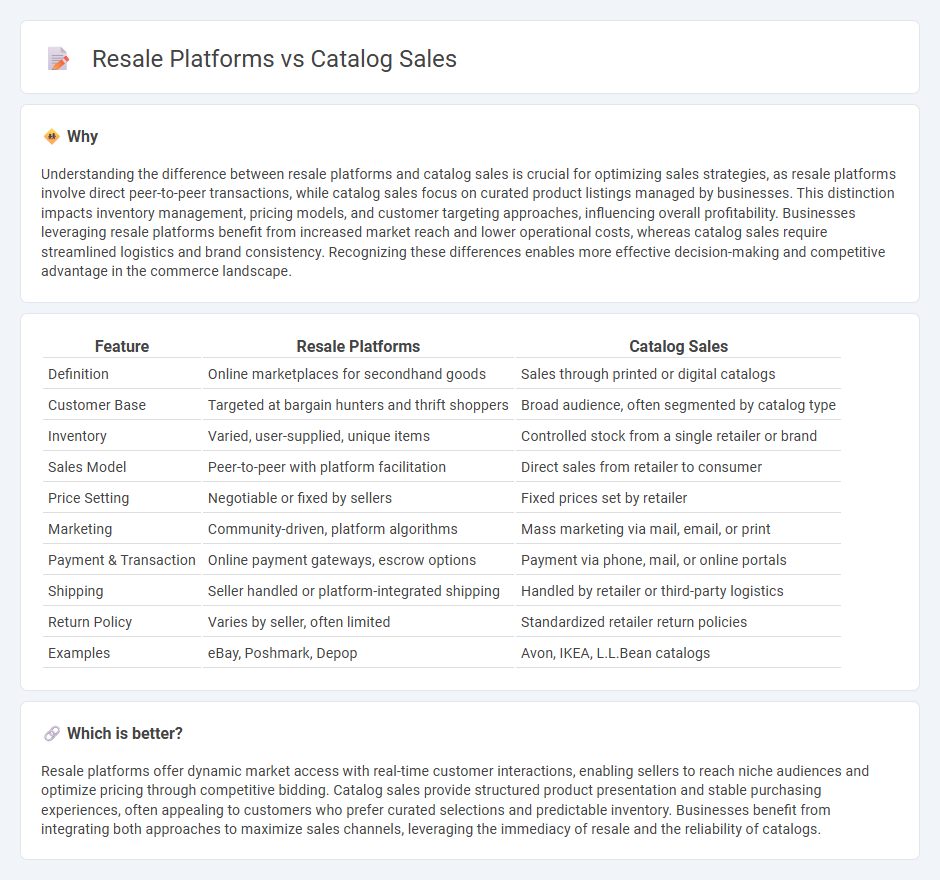
Resale platforms facilitate peer-to-peer commerce by enabling users to buy and sell pre-owned goods, often fostering sustainability and cost savings. Catalog sales focus on direct marketing through printed or digital catalogs, showcasing curated products from businesses to consumers for straightforward purchasing. Explore the differences between resale platforms and catalog sales to understand which model best suits your business needs.
Why it is important
Understanding the difference between resale platforms and catalog sales is crucial for optimizing sales strategies, as resale platforms involve direct peer-to-peer transactions, while catalog sales focus on curated product listings managed by businesses. This distinction impacts inventory management, pricing models, and customer targeting approaches, influencing overall profitability. Businesses leveraging resale platforms benefit from increased market reach and lower operational costs, whereas catalog sales require streamlined logistics and brand consistency. Recognizing these differences enables more effective decision-making and competitive advantage in the commerce landscape.
Comparison Table
| Feature | Resale Platforms | Catalog Sales |
|---|---|---|
| Definition | Online marketplaces for secondhand goods | Sales through printed or digital catalogs |
| Customer Base | Targeted at bargain hunters and thrift shoppers | Broad audience, often segmented by catalog type |
| Inventory | Varied, user-supplied, unique items | Controlled stock from a single retailer or brand |
| Sales Model | Peer-to-peer with platform facilitation | Direct sales from retailer to consumer |
| Price Setting | Negotiable or fixed by sellers | Fixed prices set by retailer |
| Marketing | Community-driven, platform algorithms | Mass marketing via mail, email, or print |
| Payment & Transaction | Online payment gateways, escrow options | Payment via phone, mail, or online portals |
| Shipping | Seller handled or platform-integrated shipping | Handled by retailer or third-party logistics |
| Return Policy | Varies by seller, often limited | Standardized retailer return policies |
| Examples | eBay, Poshmark, Depop | Avon, IKEA, L.L.Bean catalogs |
Which is better?
Resale platforms offer dynamic market access with real-time customer interactions, enabling sellers to reach niche audiences and optimize pricing through competitive bidding. Catalog sales provide structured product presentation and stable purchasing experiences, often appealing to customers who prefer curated selections and predictable inventory. Businesses benefit from integrating both approaches to maximize sales channels, leveraging the immediacy of resale and the reliability of catalogs.
Connection
Resale platforms facilitate the exchange of second-hand goods by providing a digital marketplace, while catalog sales offer a curated selection of products through printed or online listings. Both methods rely on comprehensive product information and user-friendly interfaces to drive consumer purchases efficiently. Integrating catalog sales data into resale platforms enhances inventory visibility and streamlines buyer decision-making processes.
Key Terms
Inventory Ownership
Catalog sales maintain inventory ownership by companies, enabling direct control over stock quality and availability, which ensures consistent customer experience. Resale platforms operate by connecting buyers and sellers without owning inventory, reducing overhead but limiting stock management and quality assurance. Explore the differences in inventory control to optimize your sales strategy.
Pricing Control
Catalog sales grant businesses full pricing control, allowing sellers to set fixed prices and maintain profit margins with minimal competition. Resale platforms often involve dynamic pricing influenced by supply and demand, reducing direct control but potentially increasing market reach. Discover how pricing strategies differ and affect your sales channel performance.
Customer Relationship
Catalog sales build direct customer relationships by offering personalized service and exclusive product selections, fostering brand loyalty through curated experiences. Resale platforms leverage broad marketplaces that connect sellers and buyers, emphasizing convenience and broad inventory but often with less personalized customer engagement. Explore in-depth strategies to optimize customer relationships across both sales models for sustained business growth.
Source and External Links
Catalog merchant - Wikipedia - A catalog merchant is a retail form where customers select products from printed catalogs inside the store and order them; this model typically features lower prices and less overhead due to smaller store size and limited showroom space.
Catalog Sales Definition - Law Insider - Catalog sales refer to sales of merchandise listed in a catalog, usually excluding clearance sales, and pricing is set by manufacturers or vendors in catalogs or price lists available to customers.
Sale - Sale Items & Gifts on Sale | Lillian Vernon - Online catalog sales offer a variety of products like gifts and home decor at discounted prices, allowing customers to shop catalog-based promotions conveniently online.
 dowidth.com
dowidth.com